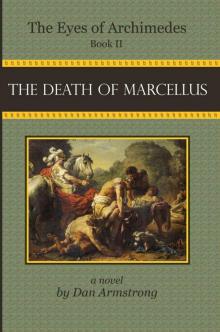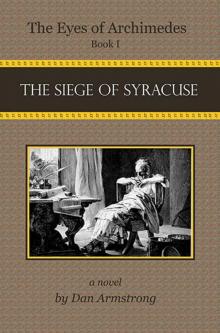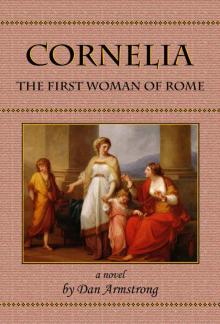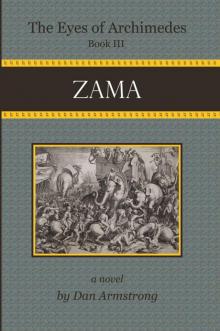- Home
- Dan Armstrong
The Death of Marcellus Page 8
The Death of Marcellus Read online
Page 8
Marcus had come across the field to join us. My eyes darted to his, knowing I couldn’t say anything about Sempronia. “I have reason to believe my mother lives in Rome, sir, and I would like to try to find her.”
Marcellus tilted his head. “Have you any idea where she lives?”
“No, sir. The night I was kidnapped, she was also seized.”
Marcus spoke up. “Father, Timon has told me about this also. How would someone find a slave in a city as large as Rome?”
Marcellus raked his fingers through his beard, freeing it of chaff and broken wheat stalks, then shook his head. “It would be like finding a quadrans”—the smallest domination of Roman coinage—“in this field of wheat. But do as you please, Timon. All I ask is that you honor your commitment to tutoring—and be careful. The streets of Rome are dangerous after nightfall. I don’t want to lose so valuable a scribe to street thugs.”
Two days later I met Edeco in the stable after the morning meal. As he bridled Balius and I managed the blankets, I asked him about the tattoos on his arms. “Are those inscriptions on your arms, Edeco?”
He lifted his left arm. “I was king of the Edantani tribe in Spain.” His Latin was heavy with what I assumed was an Iberian accent. “These symbols tell the history of my family going back ten generations.”
“How is it that you are here?” I asked, sensing the nobility of this man for the first time.
“I failed my people,” he said. “I allied my tribe with the Carthaginians. It was a terrible mistake. I was captured in a battle near the Ebro River before the war began.” The long, lean, well-muscled Iberian took a spear from a rack on the side of the stable and with one long stride threw it more than one hundred feet across the yard where it stuck in a maple tree and quivered like an arrow. He looked at me as though the action had released long pent up emotions. “Marcellus bought me at an auction in Rome to tend the stable and act as a personal bodyguard for Portia.”
His candor surprised me. “Do you have any hope of rejoining your people?” I thought of myself and whether I would ever return to Croton.
“No,” he said abruptly, finished with the bridle. “I have disgraced my people. My fate is deserved. My allegiance is now to Marcellus and his family.” He turned away from me, deliberately putting an end to the conversation. Whenever I saw him afterward, I would think of him as a warrior king.
My trip to Rome was the sixth time I had ridden Balius and the first time without the company of Marcus. I was nervous when I first set out, but I got over that quickly and soon began to feel quite comfortable on the back of this wonderful dapple gray.
About halfway into the ride, Balius lost the rhythm of his trot and began to limp. I brought him to a halt and slid off his back. I knew little to nothing about horses, but it was clear he was having trouble with his right rear leg.
I had heard of people getting badly injured from a horse’s kick and was reluctant to get behind him. Standing next to him, I inspected the leg for any obvious wound and saw nothing. Hesitantly I knelt beside him and ran my hand down his leg, looking for a sore spot. There didn’t seem to be one.
Balius lifted his hoof several times while I stood there not knowing what to do. Cautiously I used both hands to pick up his leg. A small iron nail, something that might have come from a wooden cart or a carriage, protruded from the soft central portion of his hoof. I tried to pull it out with my fingers, but the tiny nub of exposed nail was too small to get a grip on. Balius pulled his leg from my grip twice while I tried to pinch the nub between my fingers. Realizing this wouldn’t work, I thought a moment, then recalled something I had seen before. I found two flat rocks beside the road. I held them together on Balius’ hoof so that the nub was pinched between. Then squeezing the rocks tightly, I twisted them to one side and levered the nail out.
This done, I took hold of the bridle and led Balius down the road to observe his gait. With the nail removed, the limp was gone. I walked him a little ways farther, then convinced he was fine, climbed onto his back.
I kept our pace slow and constantly talked to him, trying to let him know that I was aware his hoof might still hurt. The trip took much longer than usual, but Balius was trotting at the end without any sign of pain.
Upon reaching the city, I went directly to the Claudian residence and led Balius into the stable behind the house and adjacent to the slaves’ quarters. Ithius came into the stable while I was removing Balius’ bridle and blankets. I told him about the nail. He said he would take a look at the hoof while I did my errands in town. I thanked Ithius, gave Balius a pat on the flank, then took off on foot into the city.
I had already begun a rough map of Rome, but I needed to make a few more measurements to complete the first draft. I set off to four specific locations to pace off three distances and make two sightings. Although the city was still new to me, I didn’t get lost and soon had the three distances measured.
All that remained were the sightings, both to be made from the top of the Viminal Hill on the north side of Rome. It was a good hike, but I soon stood on top of the hill, looking south. I wanted to make a sighting to the Temple of Jupiter on the Capitoline Hill and another to the highest peak of the Caelius Hill. Together they would enable me to triangulate a huge piece of the city.
When I had done the sightings with Marcus, I had used a long stick and a compass to measure angles. Being alone, I decided to make the most accurate measurement I could by enlisting the aid of the glass lenses Archimedes had given me.
I removed the leather pouch from around my neck and withdrew the two lenses. I held the crystal lens between my forefinger and thumb and extended my arm so that it pointed to the Temple of Jupiter. I used my other hand to hold the glass bead close to my right eye. I looked through the bead to the center of the disk—like aligning two knotholes to peer through. I hadn’t used the lenses in quite some time. I struggled to keep my arm steady, and squinting through the bead could be difficult for extended periods of time. After much effort, moving the crystal lens forward and back, I was able to bring the tiny replica of Jupiter in his chariot on the temple’s peak into focus. Although the image through the lenses was always upside down, the magnifying power never ceased to amaze me. Without the lenses, the chariot was no more than a speck on the roof of the temple. With them, I could see the lightning bolt Jupiter held in his upraised hand.
The lenses allowed me to make an especially accurate sighting to the peak of the temple and to the top of the Caelius Hill. When this was completed, I put the lenses back in the pouch and hiked down the hill to the forum.
From the forum, I headed east along Via Sacra to the neighborhood on the far side of the Palatine Hill where Marcus’ wife-to-be lived. I found the house with the blue Janus with relative ease and spent half an hour walking around the house, trying to get a peek inside.
I saw an elderly female slave behind the house and several house slaves come and go, but no young girl. Just as I decided to leave, a woman and a girl came out of the house next door. I was immediately struck by the girl’s fair skin and blonde hair—the color of sunlight if there is such a thing—which she wore in a thick braid that hung down to her waist.
The woman was middle-aged, short, and heavy in the hips. She wore a plain white stola gathered at the waist by a matching sash. A white palla covered her head and draped over her shoulders. The girl also wore a stola but no scarf on her head. Her stola was more stylish, dyed a pale aqua and embroidered in dark green around the hem, sleeves, and neckline.
I was so captured by the girl’s appearance that I trailed after them for several blocks to get a better glimpse of her face. I deliberately sped up so that I could pass them. At the moment I was alongside, the girl turned in my direction. For one short instant our eyes met. I fell so deeply into her blue eyes I nearly stumbled over my feet.
I quickened my pace out of self-consciousness, then took one last glance over my shoulder. How I wished this was the Sempronia I had come to find. I could tel
l Marcus that luck was with him. He would have a wife as beautiful as he was handsome. Instead, I found myself thinking about the girl the rest of the day. Though my last experience with a girl, Moira in Syracuse, had ended in heartbreak and left me with a deep cynicism regarding women, I couldn’t deny the allure of the girl’s long blonde hair and fathomless blue eyes. Despite my temporary infatuation, however, it was clear she came from a wealthy Roman family and could never be part of my life.
I wandered the streets of Rome well into afternoon, looking futilely for my mother, just as I had roamed the streets of Syracuse searching for Adeon, my family’s house slave in Croton who had been kidnapped the same night I had. It had taken all of a year to find her, and then only with the help of others. Finally giving in to the press of time, I headed to the Claudian residence to retrieve Balius and return to the farm.
When I reached the stable, I heard the voices of several women coming from the house. I ventured into the peristyle out of curiosity and recognized one of the voices as Portia’s. I hadn’t been told she was coming into Rome, but it was something she did regularly to socialize with her friends and play her part behind the scenes in Roman politics.
Peering into the atrium from between two large rose bushes, I could see Portia and three women seated on benches beside the rectangular pool. Two of them appeared to be Roman, one older than Portia, one younger. The third had darker skin and jet-black hair. She wore a long black robe, embroidered in red and threaded with gold wire. She held a short length of rope between the forefinger and thumb of her right hand. It hung straight down and contained three knots. She spoke an oath in a language I didn’t recognize, shook her hand, and the knots fell out of the rope. The other women gasped at the trick, then laughed. I noticed Laelia standing off to one side of the atrium, also watching.
One of the women asked about the Egyptian goddess Isis. The woman in black described her as the perfect mother, patron of nature and magic. I knew her as Demeter, wife of Dionysius.
At this point I realized I shouldn’t be there, certainly not eavesdropping. I turned and gasped. Edeco stood behind me.
“I spoke to Ithius,” he said in his heavily accented Latin. “He said you pulled a nail from Balius’ hoof.”
“Y—yes. I’m on my way back to the farm now,” I said as though I needed to explain myself. “What brings you here?”
“I brought Portia to Rome in her carriage,” he said with no emotion.
“I didn’t see it in the stable.”
“That’s because of the Oppian law. We left the carriage outside the city and walked the rest of the way to the house.”
“Oppian law?’
Before he could answer, I heard Portia’s voice behind me. “The Oppian law was established four years ago because of the financial strain of the war.” She had startled me as much as Edeco had, and I’m sure she saw it in my face. “Women were forbidden to own more than half an ounce of gold, wear purple, or ride in a two-wheeled carriage within the city. It was the least we could do for the war effort, but there are women who believe the time has come for this law to be repealed.”
I nodded, wondering if she had seen me watching from the garden.
“I didn’t know you were coming into town, Timon.”
“Just for the day. I’m about to leave. I heard your voice when I came to get Balius. I’m sorry if I interrupted. I didn’t expect to find you here.”
“You’ve not interrupted at all. I just have a few friends over for the afternoon.” Her words held a deep calm and intelligence. “What brings you to Rome?”
I told her the story of my mother’s kidnapping and how I had become a slave. “I seek the impossible, Portia,” I said. “I’m trying to find my mother in all the masses of Rome.” It was the first time I had told her anything about myself. I didn’t know what Marcus might have already told her.
“What was your mother’s name, Timon? Maybe I can help you.”
“Arathia Arathenus was her Etruscan name. It’s a common name, but she added my father’s name, Leonidas.”
“How old is she?”
“I believe she’s thirty-eight.”
“I can’t guarantee anything, Timon. But I know many people in Rome. Among them they own several hundred slaves. You may still want to comb the city, but your best chance is with me. I’ll see what I can find out.”
Her voice was so sincere and reassuring I was totally overcome. I thanked her profusely.
“I must return to my friends, Timon. We can talk more of this when I get back to the farm.” Portia turned and walked into the atrium.
When I entered the stable, Ithius was brushing Balius. He smiled at me. “Balius’ hoof is fine. I put some salve on the wound. You should have no trouble riding him back to the farm.” He patted Balius affectionately on the rump.
“Balius has been good to me, Ithius. Thank you for taking care of him.”
I led Balius out of the stable, and as I mounted him, Ithius came up alongside and spoke to me in Greek. “Timon, I’ve heard from Marcus that you served as a slave to Archimedes. One day when you have time, I would be interested in talking to you about Greek science.”
Although somewhat surprised by the request, I was intrigued. “Of course, Ithius, I would welcome that.”
CHAPTER 10
The war stopped during the winter months. After the middle of October, the soldiers returned home or moved into a city in the region where they were stationed. In most cases, as it was for Marcellus and Marcus, the men needed to get back to their farms to complete harvest and prepare the land for spring planting. For the Carthaginian army, which was made up of mercenaries and Carthaginian aristocrats, the break was simply rest.
By some understood agreement, never written nor discussed, both armies would return to the field of battle at the end of April to begin another season of war. Part of the reasoning was keeping the armies fed. The soldiers could only carry so much food. To some extent, they had to live off the land when traveling, and the horses and other camp livestock needed forage. This was only possible in the warmer months. So war took the winter off, but, of course, its politics did not.
My time during this lull was devoted to helping on the farm, tutoring Marcus, and at least once a week taking the trip into Rome to look for my mother and to see if I could catch a glimpse of Sempronia. After a month I had yet to have any success at either. I kept hoping to hear something from Portia, but since opening up to her about my mother that one time, I had not heard anything more and didn’t feel right asking.
Marcus went into Rome with me one cold morning in early December. He wanted no part of spying on his future wife, but he did accompany me on my search for my mother. Early in the afternoon, again with no reward for our efforts but sore feet, Marcus suggested we go to a bathhouse.
Fresh water came into Rome through an extensive system of aqueducts. Clean water was one of Rome’s luxuries. Private bathhouses were situated in various parts of the city and served as social gathering places for men of rank.
Marcus took me to a bathhouse located on the east side of the Palatine Hill in the Subura. It had three large baths of varying temperatures and a steam room. Because of the cool weather, we went to the warmest bath. The apron around the bathing pool was marble and was surrounded by a colonnade. Hooks were mounted on the columns for hanging clothes and linen towels. The pool itself was lined with multi-colored ceramic tiles. A mosaic image of a porpoise spouting water decorated the bottom. We shed our clothes and entered the water with about twenty other bathers, most of them older than we were. Being Greek I thought nothing of nudity and was quite comfortable in the presence of other naked men. Romans, in general, were not this way and were very private in matters of the body. A Greek wore nothing under his toga; a Roman wore a loincloth. Some of the men remained in their loin cloths while bathing. Marcus removed all of his clothing but seemed more relaxed once in the water.
I was a thin, gawky youth who was still growing into my body. I
had yet to shave and had only the slightest downy brown beard. Marcus, like many of the Roman men, had a good covering of body hair, but he shaved his face clean. There was a cleft in his chin, and he had a wide jaw and brow. He was as attractive a man in face and physique as anyone I had ever known. But his looks seemed to make him self-conscious. This may have been linked to an experience he had earlier in his life.
When Marcus was fourteen, a rough, older man by the name of Capitolinus remarked on his beauty in this same bathhouse, then barbed the compliment with a rude suggestion—a humiliating act that the man forced upon Marcus two weeks later.
Marcus told me this story when I first met him in Syracuse. The incident, he said, became public knowledge several days afterward when his father demanded in the Senate that Capitolinus be reprimanded for the act and stripped of all official titles and responsibilities. I believe the unwanted attention around this event caused Marcus to become a much more modest man than he might otherwise have been.
The water was only a few feet deep and pleasantly warm, not particularly hot. We leaned back against the side of the bathing pool, with our elbows supporting us, and stretched our feet out into the water.
“No hint of Sempronia when you passed her house today?”
“No,” I answered, watching others in the pool soak or splash like children. “That makes six times I’ve been there. I’ve yet to see anyone but a slave.”
Marcus kicked his feet in the water. “We need to find a way to get you into the house.”
“How could that happen? I can’t just go in uninvited.”
Marcus nodded. “I have an idea how we might change that.” His eyes diverted momentarily to a middle-aged man just entering the bathing area. “I’m thinking of requesting that Sempronia be tutored in geometry. It would enhance our marriage and give her the kind of intellectual presence my mother has.”
“Yes, that’s a good idea.”

 The Death of Marcellus
The Death of Marcellus The Siege of Syracuse
The Siege of Syracuse Cornelia- the First Woman of Rome
Cornelia- the First Woman of Rome Zama
Zama